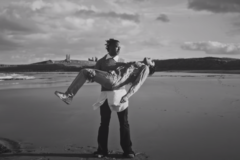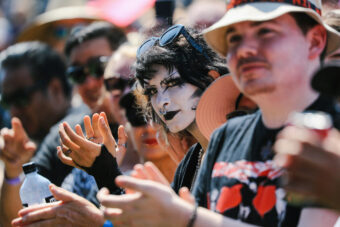Can we Wiki together a timeline that breaks down just how much hip-hop culture is derived from, or at the very least, was heavily influenced by gay culture? How Tupac Shakur grew up in house music-obsessed Baltimore (hometown of queer-cinema godfather John Waters and transgender DJ/vocalist Miss Tony), attended a performing arts high school, sported the most perfectly plucked eyebrows on a man ever, and rocked a banjee realness style? How Lil Wayne, from New Orleans, home of bounce — raucous dance music that has no need for heteronormative values — looks like a working-class drag king? How there is simply no way that the early days of hip-hop, in conversation with disco and punk, and enacting constant cultural exchange between uptown and downtown, does not bear the influence of the city’s gay-affirmative history? Perhaps if any of these angles were allowed to bubble up to the surface, the tone of recent gay-rapper thinkpieces would be less “woah isn’t this like, so weird?!” and more like “fucking finally, dude.”
Mykki Blanco is the rapping, female persona of Micheal David Quattlebaum Jr., a young African-American male with a Farley Granger-like handsomeness that sharply contrasts with Mykki’s more knotty gorgeousness. Mykki’s a rail-thin menacing model MC who can move from sexy to vulnerable to grotesque in a matter of moments; she is, like many complex, sexual humans. Blanco’s new mixtape, Cosmic Angel: The Illuminati Prince/ss, provides the same simple, rewarding slaps as most rap music, even if the beat floats from pleasant proggy bliss-outs to demonic screw moans, and even goes gabber a few times. The raps are aggressive yet inclusive. From “Kingpinnin’ (Ice Cold)”: “I roll with all types / Real niggas, real dykes / White boys with them yarmulkes / Model chicks with a million followers.” The production, from bleeding-edge dance dudes like Sinden, Brenmar, and Gatekeeper, mine the sounds of 2000s hip-hop — crunk, snap, Timbaland-ish synth vamps, trap-rap — while accentuating their avant-garde qualities. I demand a Waka Flocka cover of “Haze.Boogie.Life,” like, yesterday.
Imagine New York rap as uptown, downtown, and all-around Internet hodgepodge, and you’ve got Cosmic Angel. Tape highlight “Riot” is a mishmash of Mash Out Posse’s kick-your-ass, Tunnel-catering hook-writing and the melodic bounce of Nelly’s “Ride Wit’ Me,” while unhinged raps keep going and going and going, getting more and more absurdist, bringing to mind Da Drought 3-era Lil Wayne: “Do you take mushrooms?/ Okay bitch, because I do / I also smoke hydro/ And fuck like a rhino / And drink like a wino / And have you hit high notes.” For realz: Blanco has that same kind of Wayn-ian energy and dada lyricism, even a similar ear for off-kilter beats that don’t sound pop, but mostly certainly crack and clack and jump out of your speakers in all the right ways and end up pop. Mykki, though, is also that brain-fried weirdo you ran into on the subway last weekend. Your worst hedonistic nightmare.
Comparisons to everything but rap happen frequently with Mykki, mostly because a female alter-ego is supposedly incompatible with hip-hop’s compulsory heterosexuality. But the persona-shifting nature of rap caters to transgender remaking and remodeling. The same thick-headed types who joke that transvestites “aint fooling nobody” will tell you how all rap listeners are from the suburbs, as if any of that has to do with anything. It isn’t about “tricking” Captain Obvious. In fact, it isn’t for Captain Obvious much at all. Really, I should just be able to type “Nicki Minaj” and end it there, though one would be advised to also think of Blanco and Quattlebaum Jr. as not all that different from, say, Rick Ross and William Roberts.
Not that Blanco is singularly focused on penetrating hip-hop’s mainstream and fucking up the system from the inside. Frequently, she plays up her difference, framing herself as a monster taking over. The menacing strings at the start of “Kingpinning (Ice Cold)” invoke Godzilla, and woven throughout are clips related to X-Men (always a pop-culture expression of solidarity for outsiders), echoing out-of-the-closet director Bryan Singer’s X-Men movies, or even the 1982 X-Men graphic novel, “God Loves, Man Kills,” featuring a genocidal, mutant-fearing preacher. The final six tracks make good on that threat to radically rewrite rap by knocking it all down Godzilla-style. The songs are more fragmented and lo-fi, partially knocking over my argument that this is hip-hop like any other, while also proving how easy it is for Mykki to crack the rappin’-ass rapper code. She did that, already. Now, there are more interesting things to explore.





